Vito, a golden retriever with a heart of gold, had always been the centre of attention in his household. He was the king of his castle, lounging on the furniture, receiving belly rubs on demand, and enjoying endless walks in the park. His human, Sarah, doted on him, showering him with affection and treats. So, when news of a new arrival began to circulate, Vito couldn’t quite grasp the impending change.
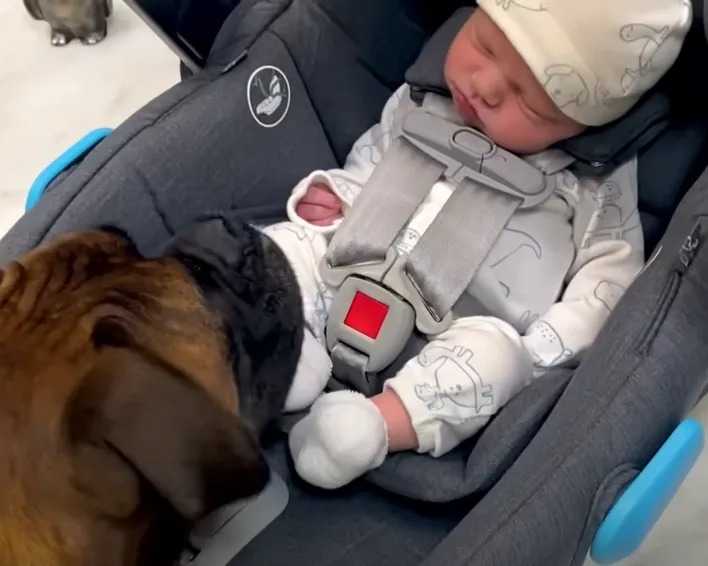
The first sign of something different was Sarah’s growing belly, an object of immense curiosity for Vito. He would rest his head on it, sniffing and nudging it gently, seemingly trying to understand the life growing within. When the day finally arrived, and a tiny human named Luca entered their lives, Vito was initially unsure. The loud cries and the constant attention Luca received were foreign concepts to him.
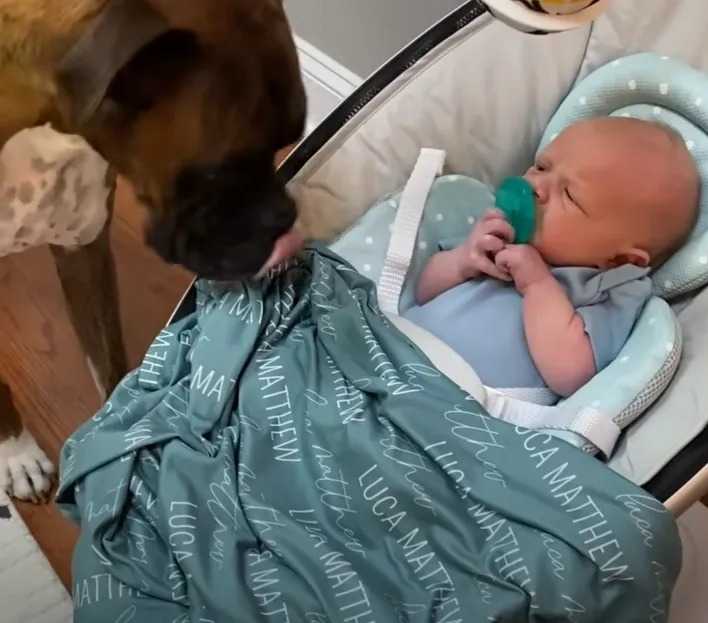
However, Vito’s protective instincts soon kicked in. He would watch Luca with a watchful gaze, following him around the house and ensuring he was always within sight. Sarah noticed a shift in Vito’s behaviour. He became more patient, and gentler in his movements, and even started bringing his favourite squeaky toys to Luca, something he had never done before.
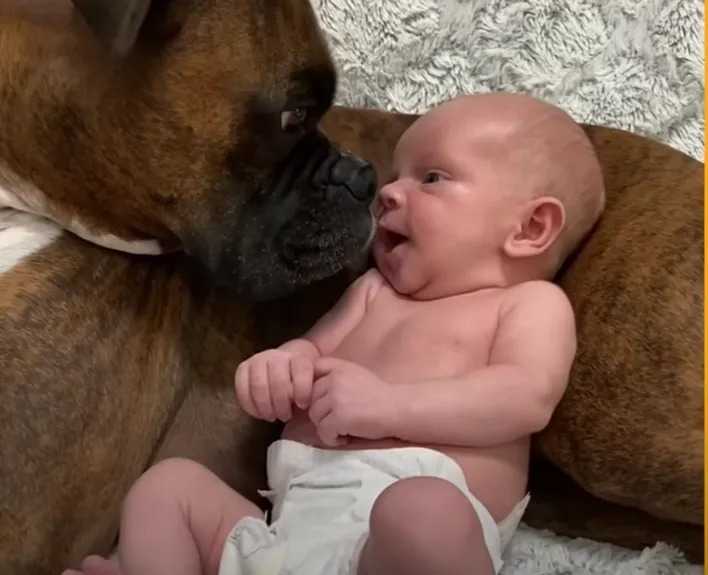
One afternoon, Luca, barely a year old, took his first tentative steps. He wobbled towards Vito, who sat patiently, tail thumping against the floor in excitement. Luca reached out a chubby hand and patted Vito’s fur, a silent pact of friendship forming between them.
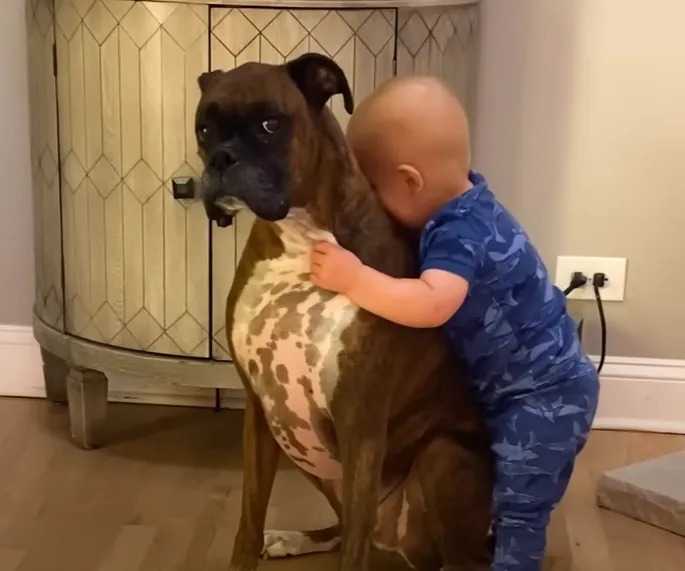
As Luca grew, their bond deepened. Vito became his constant companion, a furry shadow trailing behind him on adventures around the house. They played together, Vito patiently tolerating Luca’s clumsy attempts at tug-of-war and fetch. Mealtimes were a comedy of errors, with Luca trying to steal Vito’s kibble and Vito gently nudging the plate away.
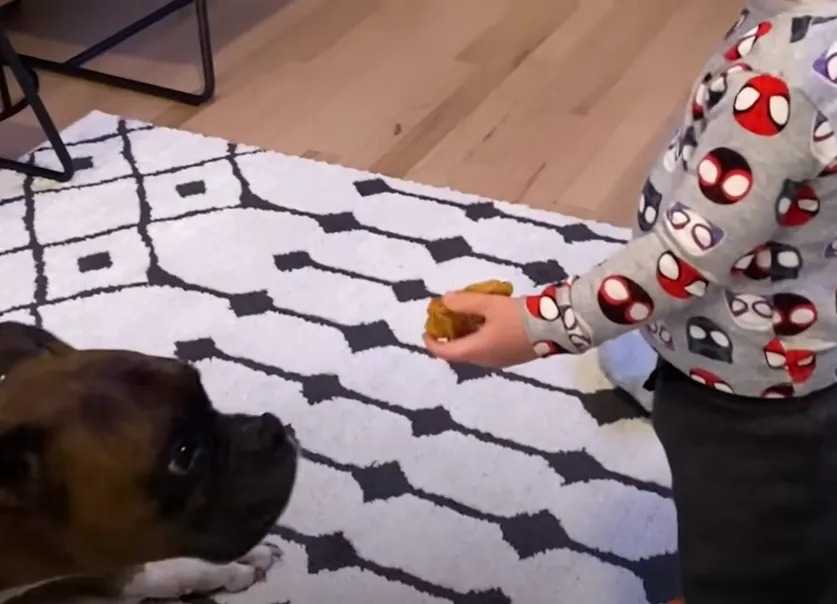
Vito’s presence proved invaluable in Luca’s development. He provided a sense of security and comfort, a constant source of unconditional love and acceptance. Sarah marvelled at their unique relationship, a testament to the deep connection that can blossom between a dog and a child. Vito, once the pampered king, had embraced his new role as big brother with unwavering devotion, proving that sometimes, the greatest joy comes from sharing your heart with another.
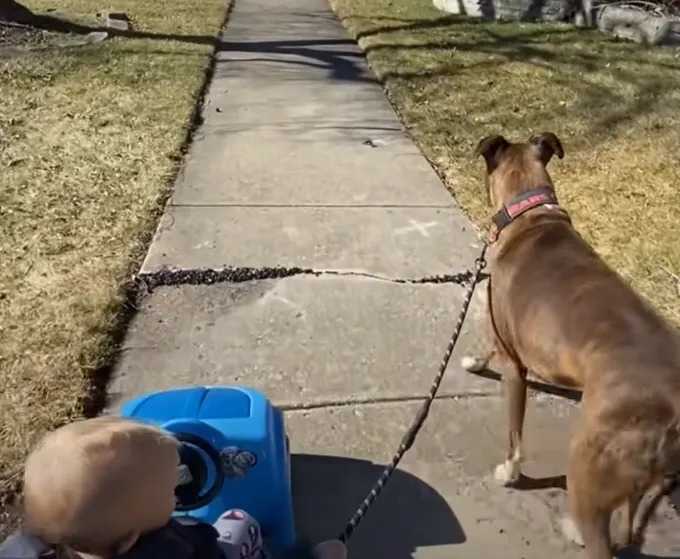
Watch The Full Video Here:
If you’ve ever wondered why your furry companion showers you with slobbery kisses, you’re not alone. Dog licking is a common behavior that can mean a variety of things in the canine world. From affection to submission, your pup’s licking habits can reveal a lot about their emotions and instincts. So, the next time your dog plants a wet one on you, there’s more to it than just a simple lick.
Dogs communicate through a combination of body language, vocalizations, and yes, licking. It’s their way of connecting with you and showing their love and respect. Understanding the reasons behind this behavior can deepen the bond between you and your four-legged friend. So, let’s unravel the mystery behind why dogs have a penchant for licking their favorite humans.
Understanding the Behavior of Dog Licking
Dogs lick you for various reasons, and understanding this behavior is essential for bonding with your furry friend.
Showing Affection:
When your dog licks you, it’s their way of showing love and affection. Just like humans hug or kiss, dogs lick as a display of their emotions towards you.
Communication:
Licking is a primary form of communication for dogs. They use it to interact with their surroundings and to express their feelings, whether it’s happiness, excitement, or a simple greeting.
Seeking Attention:
Your dog might lick you as a way to get your attention. It’s their way of saying, “Hey, look at me!” This behavior is common when they want something from you, such as food, playtime, or a walk.
Submission and Respect:
In the dog world, licking can be a sign of submission and respect. By licking you, your dog recognizes you as the leader of the pack and shows deference to your authority.
Addressing Health Issues:
Sometimes, excessive licking can indicate an underlying health issue, such as allergies, dental problems, or skin irritations. If you notice persistent licking, consult your veterinarian to rule out any potential medical concerns.
Understanding why your dog licks you enables you to respond appropriately and strengthen your bond with your loyal companion.
Reasons Behind Why Dogs Lick Their Owners
Affection and Bonding
Dogs lick you as a sign of love and closeness. It’s their way of showing affection and strengthening the bond they share with you. When your dog licks you, they are displaying their attachment and loyalty to you.
Communication of Emotions
Licking is a form of communication for dogs. They lick you to express their emotions, such as happiness, excitement, or even anxiety. It’s their way of conveying how they feel in that moment.
Seeking Attention
Your dog may lick you to get your attention. By licking you, they are trying to engage with you and communicate that they want or need something. It’s their way of seeking interaction with you.
Submission and Respect
Licking can also be a sign of submission and respect from your dog. In the canine world, licking is a submissive gesture, showing that they acknowledge you as the leader of the pack. It’s a way for them to demonstrate their respect for you.
Enjoyment and Taste
Sometimes, dogs lick their owners simply because they enjoy the taste of your skin, especially if you have recently applied lotion or have remnants of food on your hands. Licking can be a pleasurable experience for them.
Health and Grooming
In some cases, excessive licking could indicate underlying health issues in your dog, such as allergies, skin irritations, or compulsive behavior. It’s essential to monitor your dog’s licking habits and consult a veterinarian if you notice any changes.
Keep in mind these reasons behind why dogs lick their owners to better understand your furry companion’s behavior and strengthen the unique bond you share.
Health and Medical Considerations Related to Dog Licking
Dogs licking you may seem like a normal behavior, but it can sometimes signal underlying health issues that need attention. Here are some health and medical considerations to keep in mind:
1. Allergies
Your dog’s licking could be a sign of allergies, especially if they lick you after coming into contact with something they are allergic to, like pollen, dust, or certain foods. Consult your vet to determine the cause and appropriate treatment.
2. Dental Problems
Constant licking could indicate dental problems such as gum disease or tooth decay. Regular dental check-ups for your furry friend are essential to maintain their oral health and prevent discomfort.
3. Skin Irritations
If your dog excessively licks you, it could be due to skin irritations or infections. These can be caused by various factors, including allergies, parasites, or underlying skin conditions. Your vet can diagnose the issue and recommend suitable treatment.
4. Gastrointestinal Disorders
In some cases, excessive licking might be linked to gastrointestinal disorders like acid reflux or stomach sensitivities. Changes in your dog’s licking behavior, especially if accompanied by other symptoms like vomiting or diarrhea, warrant a visit to the vet.
5. Stress and Anxiety
Dogs may lick excessively when they are stressed or anxious. If your dog’s licking behavior seems compulsive or out of the ordinary, it could be a sign of underlying emotional issues that may require behavioral intervention.
6. Ingestion of Harmful Substances
Occasional excessive licking could also result from your dog ingesting something toxic or harmful. Keep an eye on your dog’s environment to prevent accidental ingestion of dangerous substances.
Remember, observing your dog’s licking behavior and being mindful of any changes can help you identify potential health issues early on. Always consult your vet if you notice any abnormal or concerning licking patterns in your furry companion.
Managing and Addressing Excessive Dog Licking
Daily Checkups
Regularly inspect your dog’s skin for any irritations, wounds, or redness. Look for signs of allergies like itching, red skin, or hair loss.
Dental Care
Maintain good dental hygiene by brushing your dog’s teeth frequently. Dental problems can lead to excessive licking as a way to soothe discomfort.
Nutritional Assessment
Ensure your dog’s diet is balanced and suits their nutritional needs. Dietary deficiencies can trigger excessive licking behavior.
Stress and Anxiety Management
Create a calm environment for your dog. Provide safe spaces and positive reinforcement to reduce stress and anxiety levels.
Physical Exercise and Mental Stimulation
Engage your dog in regular physical activities and mental challenges to prevent boredom and reduce excessive licking due to stress or frustration.
Professional Veterinary Consultation
Seek advice from a veterinarian if you notice persistent or worsening licking behavior. They can diagnose underlying health issues and provide appropriate treatment.
Environmental Changes
Evaluate your home environment for any potential stress triggers. Implement changes to make your dog feel more comfortable and secure.
Behavioral Training
Use positive reinforcement techniques to redirect your dog’s excessive licking behavior. Reward alternative positive behaviors to discourage constant licking.
Regular Grooming
Keep your dog clean and well-groomed to prevent skin irritations that may cause excessive licking. Regular grooming can also help maintain your dog’s overall health.
Monitoring Progress
Track changes in your dog’s licking habits after implementing management strategies. If excessive licking persists, consult a professional for further assistance.
Conclusion
Your dog’s licking behavior is a form of communication and emotional expression. Understanding the reasons behind it can strengthen your bond and ensure your furry friend’s well-being. From showing affection to seeking attention, your dog’s licks convey various messages. Monitoring their licking habits and addressing any excessive behavior promptly can help maintain their health and happiness. By implementing the suggested strategies, such as regular skin checks, dental care, and managing stress, you can support your dog’s overall wellness and minimize any potential issues related to excessive licking. Remember, a lick from your dog isn’t just a simple gesture – it’s their way of connecting with you and expressing their feelings.
Frequently Asked Questions
Why do dogs lick excessively?
Dogs may lick excessively due to various reasons such as anxiety, boredom, skin irritation, pain, allergies, or compulsive behavior. Excessive licking can also indicate underlying health issues that require attention.
How can I manage my dog’s excessive licking behavior?
You can manage your dog’s excessive licking by conducting daily skin checkups, maintaining dental care, evaluating nutrition, addressing stress and anxiety, providing physical and mental stimulation, seeking veterinary advice, making environmental adjustments, training behavior, prioritizing grooming, and monitoring progress closely.